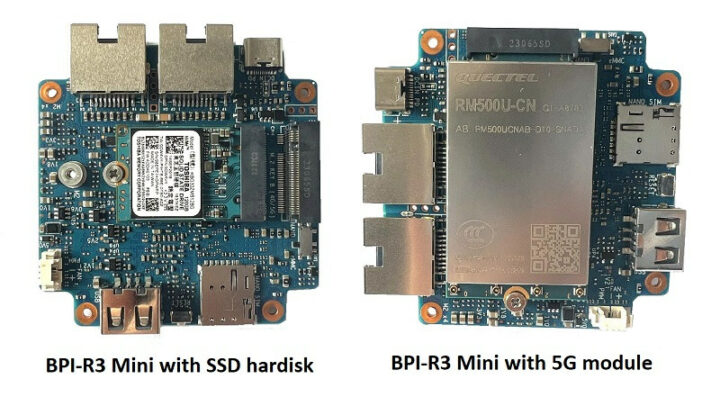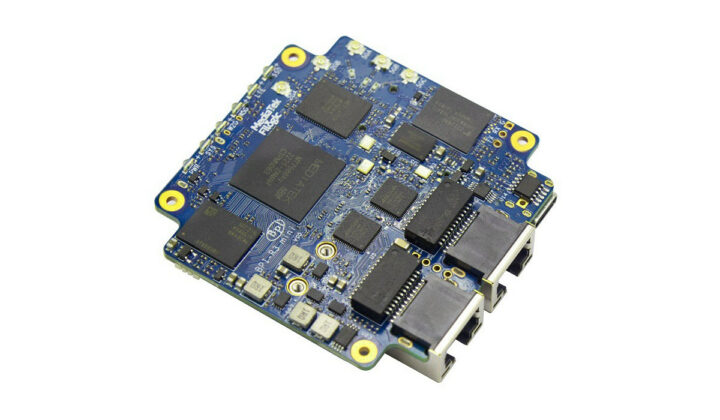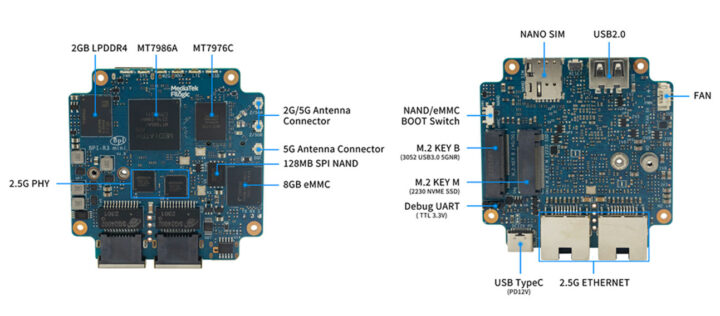Banana Pi BPI-R3 Mini router board is powered by MediaTek MT7986 (Filogic 830) quad-core Arm Cortex-A53 processor with 2GB DDR4, an 8GB eMMC flash, two low-profile 2.5GbE ports, and WiFi 6 support. It also comes with an M.2 PCIe socket that can be used with an NVMe SSD or a 5G cellular module.
The BPI-R3 Mini is based on many of the same chips as found on the Banana Pi BPI-R3 board, but with a much more compact design that makes it suitable as a 2.5GbE firewall, wireless router or repeater, home security gateway, home automation gateway, NAS device, and more.
Banana Pi BPI-R3 Mini specifications:
- SoC – MediaTek MT7986A (Filogic 830) quad-core Arm Cortex-A53 processor with hardware acceleration engines for Wi-Fi offloading and networking
- System Memory – 2GB DDR4 RAM
- Storage – 8GB eMMC flash, 128MB NAND flash, M.2 2230 NVMe SSD socket
- Networking
- 2x 2.5GbE RJ45 ports via Airoha EN8811H controllers
- Dual-band WiFi 6 via MediaTek MT7976C (2.4GHz: 574Mbps + 5GHz: 2402Mbps) and 3x U.FL antenna connectors; note: some part of the specs also list MT7975N/MT7975P, but that does not seem right…
- Optional 5G connectivity via M.2 socket & Nano SIM port
- USB – 1x USB 2.0 Type-A port
- Expansion
- M.2 Key-B 3052 socket with USB 3.0 for 5G NR module
- M.2 Key-M socket (2-lane PCIe 2.0) for NVME SSD
- Debugging – 3-pin Debug UART header (3.3V) for serial console
- Misc – 6x LEDs, fan header, NAND/eMMC boot switch, Reset button,
- Power Supply – 12V/1.67A DC via USB-C “PD” port (I have the feeling it’s actually a 12V-only port)
- Dimensions – Small
- Weight – 100 grams
While the larger Banana Pi BPI-R3 router board has got OpenWrt 21.02, Ubuntu 22.04, and Debian 10/11 images, the Banana Pi BPI-R3 Mini router’s wiki only lists two OpenWrt images at this time, one with open-source drivers, and the other with closed-source MediaTek drivers. The source code for the OpenWrt 21.02 fork, which happens to contain binary firmware files for the EN8811H 2.5 Gbps Ethernet controllers can be found on GitHub.
The BPI-R3 Mini router goes for $78.94 plus shipping on Aliexpress. For reference, the full-featured Banana Pi BPI-R3 board sells for around $92 plus shipping, so the price difference is not that great, but the Mini version is still quite interesting since it packs so many features into a tiny form factor. Users wary of software support on Banana Pi boards may consider the Rockchip RK3568-based NanoPi R5S router instead, still with dual 2.5GbE networking and NVMe SSD support, but note that WiFi and 5G can only be added via USB 3.0 dongles.

Update: This article was initially published on March 14, 2023, and updated following the publication of further documentation and availability on Aliexpress.

Jean-Luc started CNX Software in 2010 as a part-time endeavor, before quitting his job as a software engineering manager, and starting to write daily news, and reviews full time later in 2011.
Support CNX Software! Donate via cryptocurrencies, become a Patron on Patreon, or purchase goods on Amazon or Aliexpress







Airoha, not Aihora which sounds very rude in Swedish…
The Banana Pi BPI-R2 Pro Rockchip has an RK3568 and 5x GB ethernet. No wifi onboard but PCIE for wifi.
Would be nice to test side-by-side. The RK3568 has been proven too slow for 2.5GB ethernet (at least the FriendlyElec). If the slower A53 would be able to perform it can be concluded the Mediatek acceleration works better for network applications.
Only because wifi is already onboard the R3-mini will be cheaper.
Most likely poorly optimised networking driver rather than an SoC limitation. It should be possible to get this SoC to work just as well as any router SoC for this purpose.
MTK makes good router chips, so there should be no issues here.
Agreed, the CPU cores are almost irrelevant here, especially at such low speeds. The network controller and its driver are way more important to determine how queues and buffers are managed and what offloading options are supported. I could already proxy at 1Gbps on the single-core ARMv5 Feroceon 1.2 GHz in the Guruplug Server plus. A quad-A53 is much more than 2.5 times as powerful! And the quad-A72 in the mcbin are fine doing that at 10 Gbps.
It’s one thing to simply route, and another to run things like SQM.
https://openwrt.org/docs/guide-user/network/traffic-shaping/sqm
My dual core 1.8GHz Linksys WRT32X runs OpenWRT SQM at only 500Mbps.
Note: above I mentioned “proxy”, not just “route” 😉
> The RK3568 has been proven too slow for 2.5GB ethernet (at least the FriendlyElec)
See here please. The very same A55 as in RK3568 at same clockspeed are sufficient with appropriate driver and appropriate settings (PCIe ASPM for example) to saturate a 2.5GbE link.
Mt7986 is dedicated chipset for router. There are several branded wifi routers using the same chipset. So it’s going to be very fast as an router compared with devices using regular general purpose cpu.
Would be nice, but sadly its banannaware, so better stay away.
Hardware is acceptable, but software, not so much.
Yeah I agree. I remember having got a banana board several years ago, I don’t even remember which one. Basically it was turned into an SMD components source, because there was nothing else that could be done out of it. I’ve always suspected they were reselling hardware they’d done for other customers but are not allowed to distribute the software so you’re on your own.
They’ve unfortunately picked some hardware that has been “unsupported” by the chip maker, mainly MTK hardware, in the sense that BananaPi didn’t pay for the support and software, so MTK only gave them the basics to get their boards up and running, but not performing well. MTK has at least in the past, had a lot of “secret sauce” components to their chips and unless you paid extra for it, you couldn’t use things like hardware offloading and various network accelerators. Not sure what applies in this case and I really hope they’ve changed how they do these things, both… Read more »
I followed the BPi MTK journey only for a short time but back then a few highly motivated OSS enthusiasts being employeed by MTK appeared both over at the Banana forum and in their Github repos. The one I’ve talked to said they want to convince their management to conform more to open source principles though no idea how that went.
That would be nice, as they have really decent hardware, but they don’t seem to have given a F about open source back around that time. I actually met with a few MTK people around the time of the MT7623 being their best router SoC and they were simply impossible to work with.
Now a days a lot of open source contributions, that are not working for banana pi, contribute towards creating images etc.
The main problem is SinoVoip being run by a chiphead who doesn’t understand software being important. Almost every new board from them relies on another SoC and as such BSP/SDK and even if some folks over there really work hard to cope with the software side, they’re sabotaged by both the copy&paste monkey still responsible for their ‘documentation’ and their boss.
Sounds like a lovely place to work…
What do you mean? You can run vanilla openwrt people!!
Native openwrt support is golden.
yes, TUF AX4200 HW spec is similar to BPI-R3 mini, and
OpenWRT native support this device.
https://github.com/openwrt/openwrt/commit/e7c399bee677e9bac66e1bea697aefb8d828edfe
So for all the flaws their still selling, perhaps they have some revenue making method. Or do they charge for proper support?
I wonder if the hardware acceleration is good as the quad A53 doesn’t inspire much in a 2.5 GbE router.
There seem to have been a few announcements lately about boards with Cortex-A53.
Are there roadblocks in adopting A55 (let alone A510) or are chip-makers just milking it without the upfront cost of new R&D?
I suggest you read up on how Arm’s licensing works. It’s the biggest reason why most companies stay with one of their cores for so many chip designs. It gets very expensive to move to new Arm cores if there are no direct benefits, which it rarely is for these type of devices.
What CPU cores do you think most rotuers are using? The Cortex-A53 is what you’ll find in most high-end consumer routers and some of those chips can do 10 Gbps, which means there’s no issues here.
From BPI-R1 to BPI-R3, BPI always keeps producing new network devices. Most of other vendors are just making another 4k or AI board. Of couse everyone knows SolidRun’s devices have better linux mainline support but more expensive. BPI provoides another choise and I have a lot of fun when flashing firmware and running benchmark even there are lots of bugs since that means I have lots of things to try and hack. I appreciate BPI and the guys who contribute source code even they are different guys.
no official cases?
There’s a case for the BPI-R3 Mini, but they don’t seem to sell it yet.

If you pay for bananas – you get bananas!
😩 wish the b’ key was on the other side and the ‘m’ could take a full length. 🙁